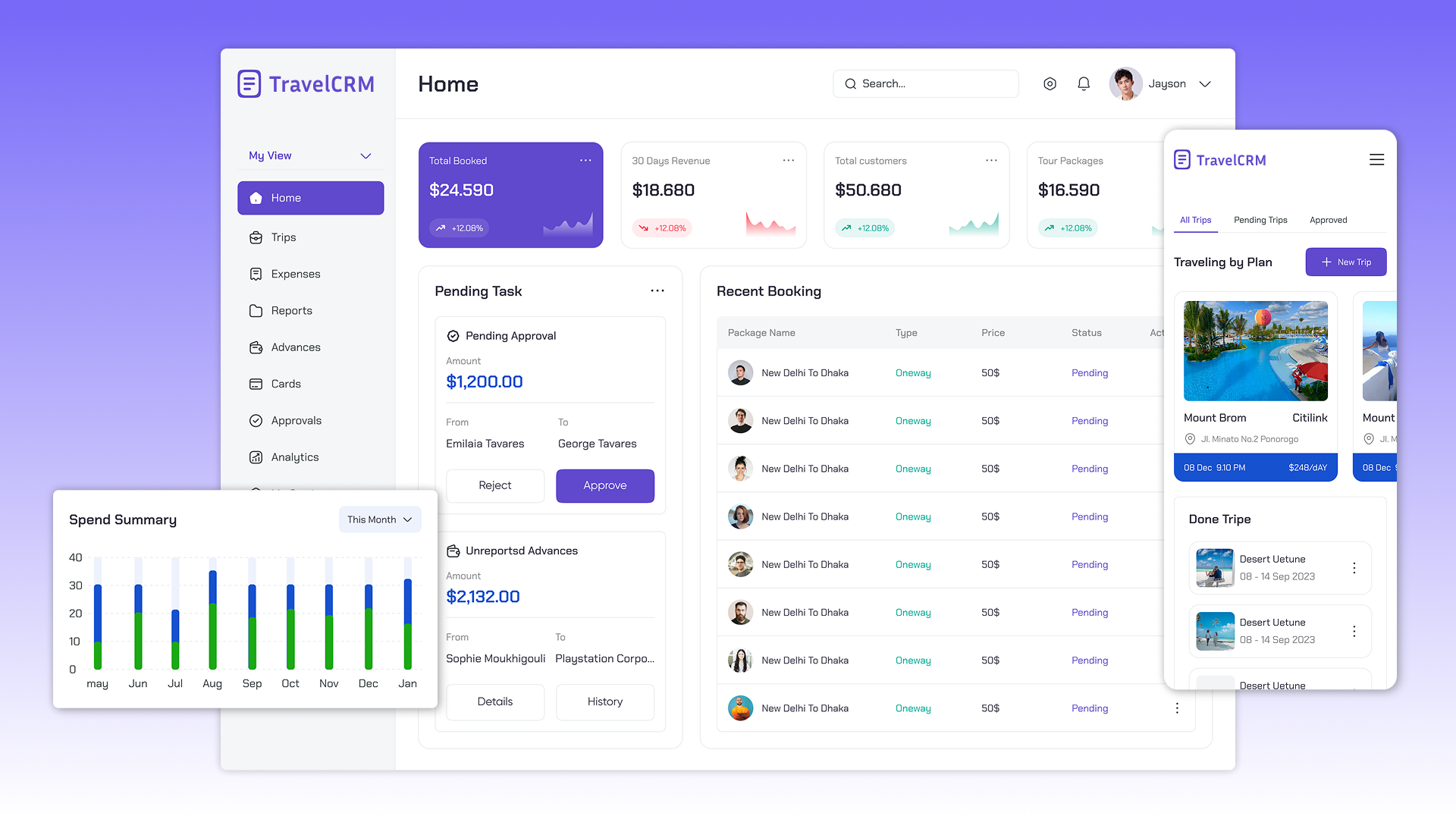
The travel business is characterized by dynamism: rapidly changing trends, unstable demand, seasonality, and a high level of competition. In the chaos, leads disappear, bookings are duplicated, and customers receive outdated information. For successful work, you need to automate processes, quickly process customer requests, analyze the effectiveness of marketing campaigns, personalize offers, and keep convenient records of bookings. All this is possible with CRM for a travel agency.
Are your managers still looking for a client in a list with hundreds of contacts, answering calls, and trying to remember to enter a new application in Excel? Ordering the development of CRM for a travel business from AVADA MEDIA means forgetting about the mess in management and taking your business to the next level.
CRM for a travel agency is a customer relationship management system that helps to organize all the business processes of a travel company: from the first contact with a client to the end of their trip and subsequent performance analysis.
Imagine this: your travel agency receives dozens of inquiries every day. Managers are torn between calls, social media, mail, and instant messengers, trying not to forget a single customer. Reservations are lost, customers don’t receive timely responses, and marketing campaigns are running blind. As a result, profits are lost, reputation deteriorates, and stress levels rise. This is how a company that has not automated its work with CRM for tourism works.
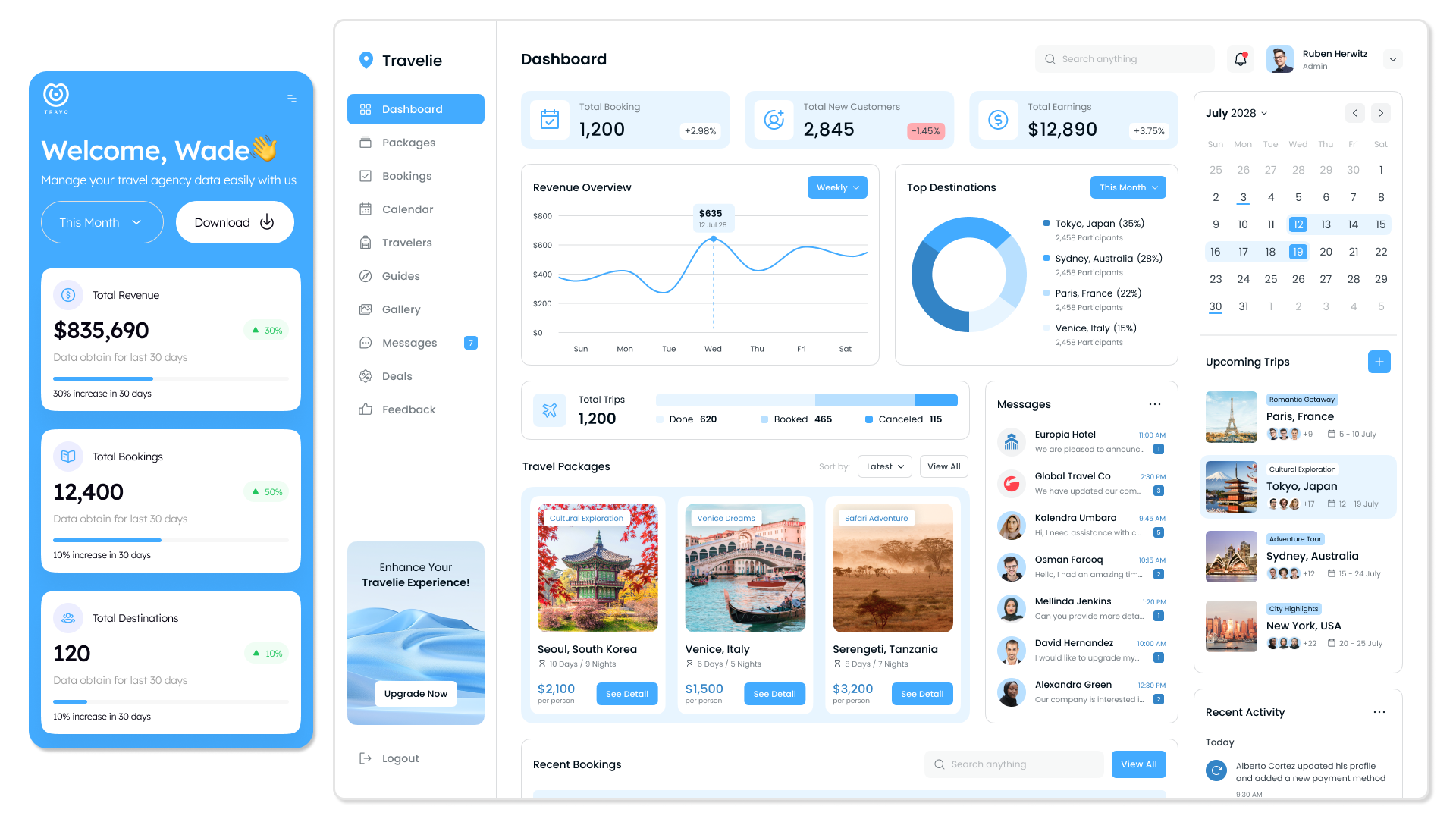
CRM systems in tourism create many opportunities for effective business management:
Companies that have implemented CRM in tourism act quickly, confidently, and without mistakes. All inquiries are collected in a single interface, managers see the history of interactions with each client, and automated processes reduce the time spent on routine tasks. Competition in the tourism industry is high, and those who lag behind in the implementation of digital solutions are doomed to lose customers.
A CRM system for a travel agency is not just a program, but a reliable tool that can take on numerous tasks, such as:
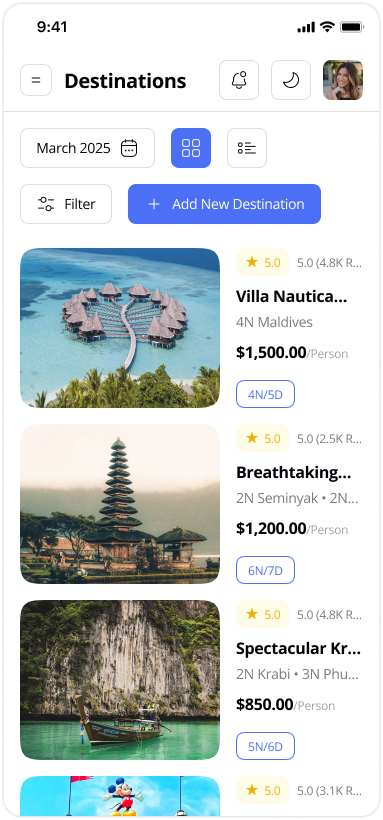
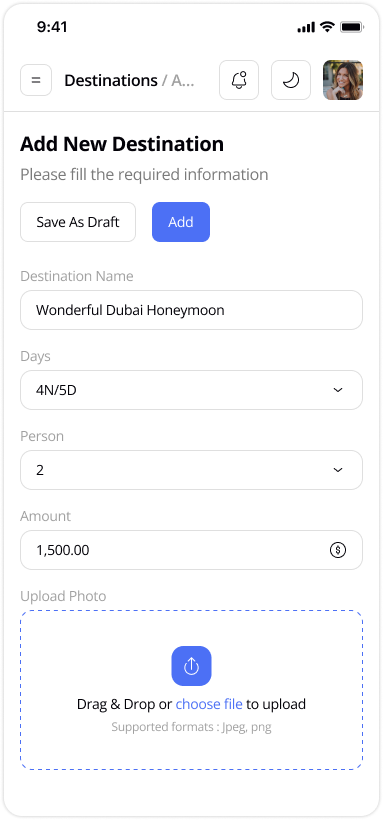
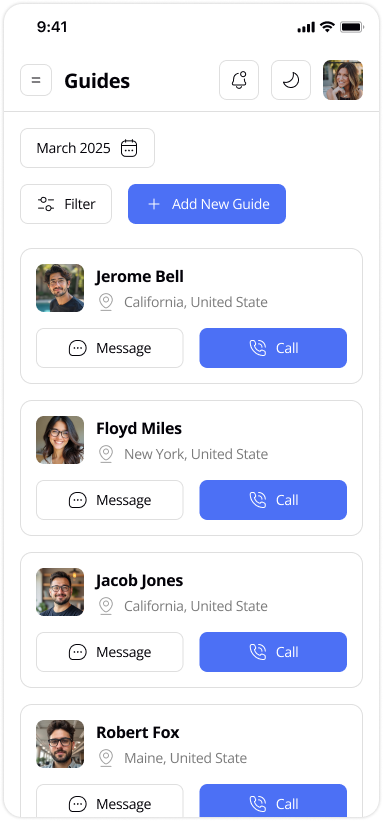
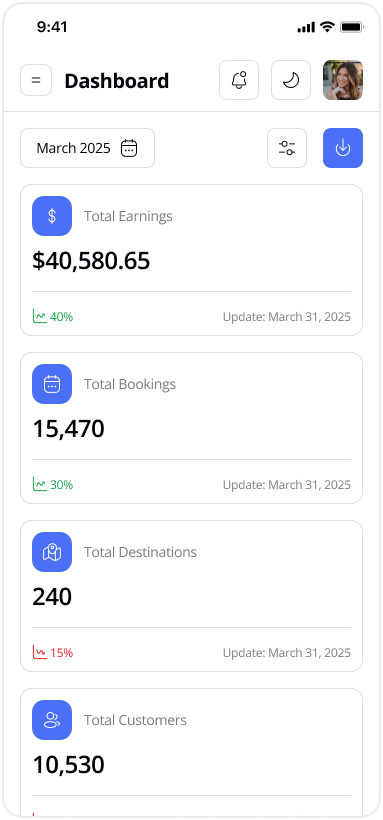
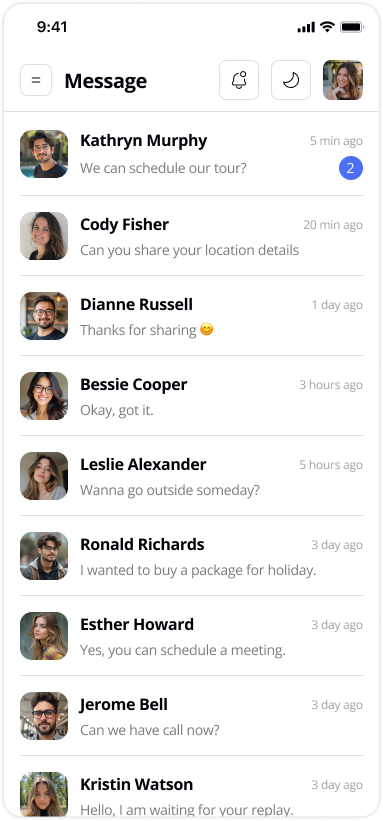
Mobile version of the CRM system for a travel agency
Despite the common goal of selling travel services and providing quality customer service, tour operators and travel agencies operate under different business models, which directly affects the functionality of management systems.
CRM systems for tour operators are focused on managing the full cycle of creating and selling travel products. The main features of such programs are:
CRM system for travel agencies is more focused on working with the end client and selling ready-made tours, so their functionality is usually as follows
The choice of a CRM system depends on the role of the company in the travel industry. Tour operators need a functionally broader and more flexible system with a focus on B2B, logistics, and product line management. Travel agencies need an easy-to-implement CRM focused on closing deals quickly and making repeat sales.
CRM systems for tour operators
The CRM system becomes the basis for impeccable customer service at every stage of interaction – before, during, and after the trip.
Before the trip, the program can:
During the customer’s trip, the CRM system for tourism:
After the trip, the program for travel agencies helps:
Off-the-shelf solutions have limited functionality that cannot take into account the specifics of the work and needs of a particular company. Individual development of CRM for travel agencies allows you to create the most adapted management system, with such advantages as
Customized CRM development is an investment in the future of your business. The system will develop along with your travel company, adapting to new needs and market conditions.
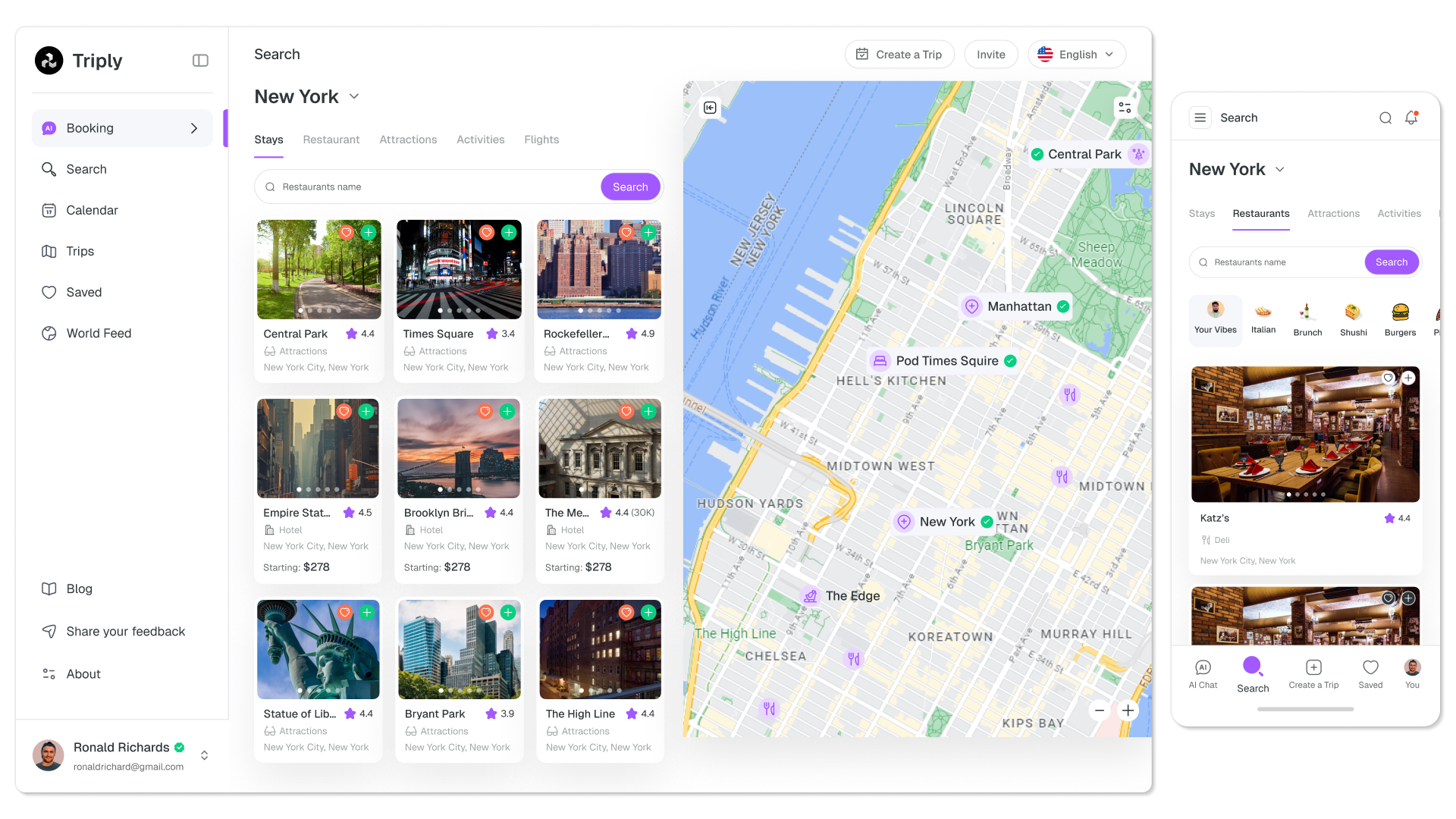
Modern technologies and tools are used to develop a CRM system for tourism:
The development of a CRM system for a travel company is a complex, integrated process aimed at creating a global digital environment. Therefore, to achieve the best result, it is important to have a consistent and professional approach to each stage.
The first stage of development is devoted to studying the specifics of the travel business, identifying the key problems that the product must solve, analyzing competitors and current automation tools. To develop a CRM, you need to know the details, for example: the key stages of booking – from the initial customer request to booking confirmation and after-sales service; the format of interaction with tour operators – how exactly information about tours, prices, availability, etc. is exchanged.
Also at this stage, existing management tools are evaluated. Key questions include how customer information is stored, what tasks are performed manually, what data is lost, and what processes take too much time.
The technical specifications describe all modules, integrations with third-party services, and user scenarios. Typically, the components of a CRM for a travel agency are as follows:
At this stage, the framework of the future system is formed, the database structure, business logic, and basic user interaction scenarios are determined. Interactive prototypes of the interface are developed to visualize key processes, from booking tours to managing customer requests. Access levels are also provided so that each employee can work only with the data they need.
Designers develop a responsive design optimized for different devices, create the logic for the visual placement of blocks, and check the ease of interaction – managers must quickly navigate the status of bookings, tour availability, payments, and communications with customers. The interface should be user-friendly, intuitive, and modern, and match the visual identity of the entire brand.
At this stage, developers write code for the server side (backend), creating CRM business logic and setting up the database. An API is implemented to process requests, manage bookings, and securely store information. At the same time, we develop the client side (frontend), which provides a convenient interface for travel agency managers and clients. Integrations with external services are also being set up: booking systems, mapping platforms, payment gateways, and email newsletters.
Testing includes checking the load (resistance to a large number of requests), functionality in different booking scenarios, taking into account various user errors, and UX/UI. Programmers fix bugs and improve system performance.
The final stage involves setting up the server environment, deploying the CRM on the hosting, and testing it in real-world conditions. After the release, the travel company gradually transitions to the new CRM to ensure the smooth operation of the agency. Each employee should receive clear instructions on how to work with the new system and timely assistance in solving problems.
In the travel business, a quick response to changes in legislation, tour operators’ requirements, and customer preferences is critical. Technical support after the development of CRM is needed to fix errors and add new features, update the security system, and increase the system’s capacity as business volumes grow.
Do you strive for effective travel business management? The time has come when customers expect personalized service and instant responses, so investing in automation is the right decision.
AVADA MEDIA is your reliable partner in creating software solutions for business. We provide teams of specialists who have extensive experience in developing CRM systems for travel agencies and take care of all stages of development, from analyzing business processes to supporting the system after launch.
Is it possible to integrate a travel agency CRM with a website?
Yes, CRM can be integrated with a website to automatically receive requests, display current tours and bookings in real time. This greatly simplifies the work of managers and improves the user experience.
Does the CPM system for tourism support automatic emailing to customers?
Yes, the system can automatically send email, SMS, or messenger messages with reminders, promotions, booking statuses, or personalized offers.
How does it help to avoid duplicate bookings?
The CRM system for travel agencies has a centralized database that is instantly updated, as well as mechanisms to prevent duplicate applications. This reduces the risk of errors and double bookings.
Can I customize access levels for employees?
Yes, you can set different access levels in the management system for administrators, managers, accountants, etc. This allows you to ensure data security and control over workflows.
What reports can be received in a CRM system for a travel agency?
CRM allows you to generate reports on sales, advertising effectiveness, popularity of destinations, customer behavior, and manager productivity.
How does it simplify work with tour suppliers?
The system allows you to store supplier contacts, automate interaction, update prices, control payments, and keep a history of cooperation.
Is it possible to integrate CRM with payment systems?
Yes, CRM can be connected to various payment systems to automate payment acceptance, invoicing, and accounting of financial transactions.
Do I need a CRM system for a small travel agency with a limited staff?
An individual CRM is needed for a travel agency of any size. At the very least, it will help you keep your customer base under control, simplify communication, and avoid mistakes. This is especially useful when there are only a few employees in the team and everyone performs several functions at the same time.
How long does it take to develop a CRM system for a travel agency?
The development and implementation period depends on the number of processes and the depth of customization, but it usually takes 3-4 months. You can implement many functions, but you choose what you need at the current stage without overloading the program with unnecessary features.
Our works
Contact the experts Have a question?
Developed by AVADA-MEDIA™
The user, filling out an application on the website https://avada-media.ua/ (hereinafter referred to as the Site), agrees to the terms of this Consent for the processing of personal data (hereinafter referred to as the Consent) in accordance with the Law of Ukraine “On the collection of personal data”. Acceptance of the offer of the Consent is the sending of an application from the Site or an order from the Operator by telephone of the Site.
The user gives his consent to the processing of his personal data with the following conditions:
1. This Consent is given to the processing of personal data both without and using automation tools.
2. Consent applies to the following information: name, phone, email.
3. Consent to the processing of personal data is given in order to provide the User with an answer to the application, further conclude and fulfill obligations under the contracts, provide customer support, inform about services that, in the opinion of the Operator, may be of interest to the User, conduct surveys and market research.
4. The User grants the Operator the right to carry out the following actions (operations) with personal data: collection, recording, systematization, accumulation, storage, clarification (updating, changing), use, depersonalization, blocking, deletion and destruction, transfer to third parties, with the consent of the subject of personal data and compliance with measures to protect personal data from unauthorized access.
5. Personal data is processed by the Operator until all necessary procedures are completed. Also, processing can be stopped at the request of the User by e-mail: info@avada-media.com.ua
6. The User confirms that by giving Consent, he acts freely, by his will and in his interest.
7. This Consent is valid indefinitely until the termination of the processing of personal data for the reasons specified in clause 5 of this document.
Send CV
Contact us in any convenient way for you:
+ 38 (097) 036 29 32